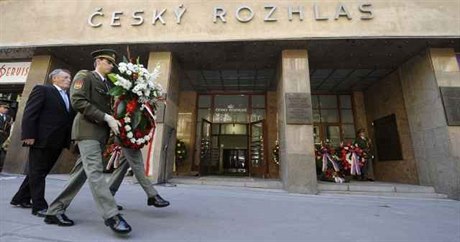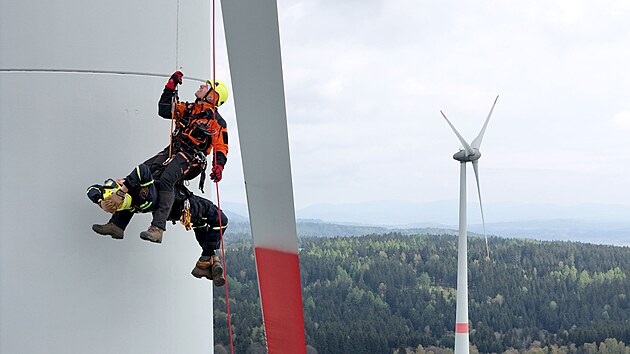Many people living in the Czech Republic did not even know about the international shortwave service of public broadcaster Český rozhlas 7 — Radio Prague —when it went off the air just a few months shy of its 75th birthday, but then it wasn’t really intended for them.
One of the oldest international radio broadcasters in the world, Radio Prague was meant to break down borders. It was based on what was then relatively new technology, which the state put into place in 1936. At that time, the impetus was to counter early Nazi propaganda, set on defacing the Czechoslovak image abroad through its own wireless service.
Radio Prague would, according to the then-minister for post and telegraphs, provide state “propaganda and information in the world’s major languages” as well as programs for Czechs and Slovaks who have settled abroad. “The mission of this new shortwave service will also be important because our culture — and especially our music — will find new audiences around the world, allowing us to show other European states to what extent we have contributed to the development of mankind in an atmosphere of friendly competition.”
Return to glory days
It was only in the last two decades that shortwave radio was actually able to consistently fulfill that function to the letter. In the time between, it had some shining moments. It was — literally and unsentimentally — the country’s link to the world amid the mounting tensions before the outbreak of World War II, and the cry for help when the war’s end was in sight. It was virtually the only primary source of information for those outside the country in 1968 when Soviet-led tanks overwhelmed a blossoming Prague Spring.
Since 1990, shortwave has allowed the message of life after repression to flow freely to Latin America, Belarus, Yugoslavia, Africa — wherever people can obtain a cheap SW radio and speak one of the dozens of languages the station has experimented with over the years: Arabic, Swahili, Portuguese, Esperanto, to say nothing of the major European languages. Some recompense for its roughly 40-year role as the chief global dispenser of Czech communist propaganda in the interim. In the age of podcasts and tweeting, the very word ‘shortwave’ draws blank looks, but listeners around the world feel ‘betrayed.’
But the past two decades heralded a new age. The very word “shortwave” draws blank looks among media consumers today. Yet if every Czech could read the mail received by Radio Prague from various countries in response to the closure of shortwave, perhaps they wouldn’t feel that terrible sense of “smallness” that they’ve learned to live with since the breakup of their greater state. Many people in radio clubs in places like India and the Middle East wrote they were “heartbroken” by the move.
Other listeners in Europe and America scoffed at shortwave — if the cost of keeping the medium meant losing the information they receive digitally about the Czech Republic, its business, politics and culture.
The plug wasn’t actually pulled on the Czech shortwave broadcast; it kind of slipped out of the socket. There were reports seven years ago that the service was finished. SW enthusiasts, then as now, turned to the Internet to voice their dismay. There was the loss of the FM channel shared with the BBC. There was last year’s restriction of SW service, when the Czech Republic fell silent in the Siberian woodlands and Patagonia (and, to be fair, much of the western United States and Africa, where there had been a hearty following).
There were the two bouts of general layoffs at Český rozhlas 7, the trimming of the program to ease the load of the remaining staff, and, in the end, an (un)cosmetic musical makeover more befitting of the station’s bride-to-be: the podcast (read: getting sued for someone downloading music off your podcast isn’t worth the unlikely risk).
Streamlined for new technology
Český rozhlas 7 is more like Český rozhlas “0” today, operating in a quasi-land where it’s housed and outfitted by the public broadcaster, but funded — sometimes even noticed — by the Ministry of Foreign Affairs. In the age of the podcast, there can be no doubt of its potential: being the only thorough, primary-source broadcaster with a name of renown, posting professional, daily coverage of all facets of Czech society in six languages for free, to say nothing of an online archive of all that has happened on this patch of earth of note in the past decade.
The bottom line, however, is that everybody at Radio Prague got a stocking full of coal this Christmas; the name of the game this year is “austerity,” and every ministry must decide what they love and what they leave.
On Tuesday, Radio Prague received a call from Egypt, from a Czech woman unable to get home from the turmoil there, and relying on a shortwave radio as her main source of information from Prague. As luck would have it, the broadcast was cancelled on her, and she used the same word that many other listeners of 40 and more years used to describe their feelings: “betrayal.”
It is doubtful that, some sunnier day, the Ministry of Foreign Affairs will decide to relaunch Czech shortwave service and reconnect with its avid Sri Lankan, Chinese, roving Czech and hobbyist listeners. But there are ways to make amends, if it only wishes to do so. The post-shortwave era, with its iPods, e-book readers, smartphones and tweets, offers a lot of opportunities for international, interpersonal communication that Radio Prague is still up to. But it needs vision, ministerial will — and money.
If it gets it, then for every Czech that didn’t know about their own proud history of shortwave broadcasting there could be two who are proudly aware that their nation’s international message is out there on all fronts.
Christian Falvey is a reporter for the English section of Radio Prague (Český rozhlas 7)




